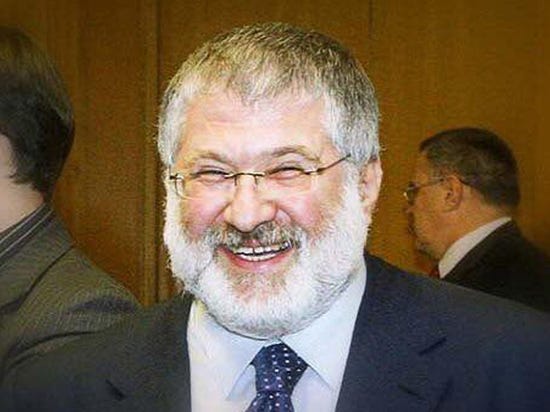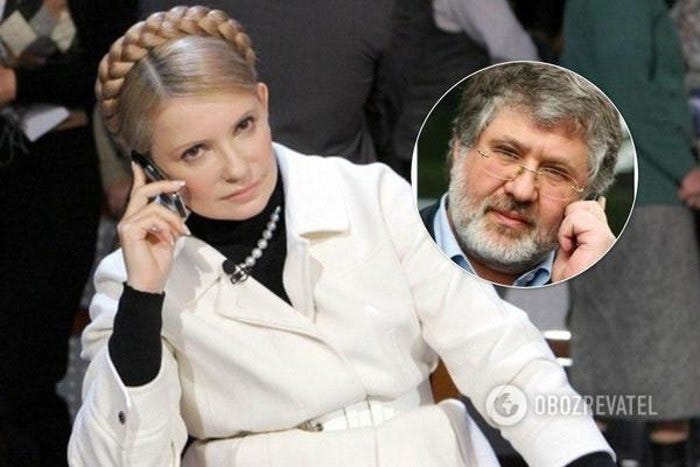Igor Kolomoisky's 2008 interview II: Privatization wars, the difference between a hamster and a rat
Tymoshenko the Trotskyist black widow / Kolomoisky the modern day Robin Hood / Gazprom's honour / justice and interest / conflict with Russian business
Click here for part 1 of this 2008 interview with Ukraine’s most infamous oligarch. The original text of the following is here. If you like my work, consider becoming a paid subscriber.
The main topic of the following interview - Kolomoisky’s ‘principled opposition’ to the Donetsk clan of Rinat Akhmetov (Ukraine’s richest man) and the Party of Regions, and his troubled relationship with Yuliya Tymoshenko. He faults both of them for meddling in business too much.
What’s interesting is that Yuliya Tymoshenko, who Kolomoisky openly admitted in part 1 of this interview to funding during the 2004 Orange Revolution, had also got on Kolomoisky’s nerves, in large part because of the painfully high gas prices that resulted after her antagonization of Russia.
This seems to be a recurring pattern with Kolomoisky - funding pro-western populists to get rid of a ‘pro-Russian’ government that started restricting Kolomoisky’s business freedom, only to pine nostalgically for the pro-Russian government after the economy goes to bits. I wrote about Kolomoisky’s betrayal of the euromaidan camp in the late 2010s in this article.
Some things to clarify for readers:
Rosukrenergo was a company set up to deal with transporting Russian gas through Ukraine. Given how lucrative and dependent on access to government power this business was, this company became the focus of various intrigues. Dmytro Firtash is considered to have become rich through this company. Several representatives of Rosukrenergo would become quite influential over the Yanukovych government. For the purposes of the following, 2008 interview, Rosukrenergo is relevant in terms of the ‘gas wars’ that took place between Yuschenko/Tymoshenko’s government and Russia. The following is from Mark Mackinnon’s book the New Cold War:
“Since the collapse of the USSR, Russia had provided subsidized gas to most of the former Soviet Union, including Ukraine. Now it was clear that the arrangement had been conditional on those countries’ deference to Moscow. Ukraine, Georgia, Moldova and the three Baltic states would all face sharp price increases in 2005 and 2006, while Gazprom would continue to provide cheap gas, at $47 per 1,000 cubic metres, to Belarus and the pliant regime of Alexander Lukashenko. Though Yushchenko had his own card to play (most of the gas Gazprom supplied to Europe went through Ukraine), he blanched when gas deliveries stopped for twenty-four hours at midnight New Year’s Day. He signed a deal under which Ukraine agreed to pay a relatively modest $95 per 1,000 cubic metres but gave Gazprom the option of reopening the price discussion six months later. In the meantime, Gazprom would provide the gas to Ukraine through a mysterious middle company called RosUkrEnergo, which had previously been under criminal investigation. Tymoshenko, back in opposition, noisily slammed the deal as capitulation to the Russians and to organized crime. Many Ukrainians started to recall the era of Kuchma and Yanukovych—and their good relations with Russia—more fondly.”
Reprivatization. This was a key slogan of the 2004 orange revolution, the ‘revolution of the millionaires against billionaires’, as it was often called. The idea was to reprivatize Soviet companies that were shadily privatized in the 90s. The stated aim was to ‘reduce corruption’ and make sure that the winners of the 90s turf wars (‘the oligarchs’) didn’t control the whole economy. Reprivatization was a complex drama, and naturally Kolomoisky angled very hard to expand his empire during the reprivatization saga.
In this interview, Kolomoisky seems to heavily hint that he sponsored Tymoshenko to come to power precisely with the hopes that she would tilt reprivatization his way, so that he could get his mitts on some of the jewels of Soviet Ukraine’s industry.
Tatar- this is Kolomoisky’s way of referring to Tatneft, one of Russia’s large oil companies. Kolomoisky is quite paranoid about their attempts to enter the Ukrainian market. I might add also that Rinat Akhmetov, Kolomoisky’s arch-nemesis, is of Tatar origin, though he grew up in the Donbass. The following from wikipedia is helpful in following Kolomoisky’s train of thought around the Kremenchuk oil refinery.

- Who is better for you - Prime Minister Yanukovych or Prime Minister Tymoshenko?
- Still Tymoshenko.
- Why?
- Because under Prime Minister Tymoshenko, I am not aware of cases where a company like 'Dniproenergo' was taken, its shares diluted, and perhaps even taken away, possibly even by legal means. The state had 76% of the shares, and suddenly it turned out to be 51%.
I know that all of this happened under Yanukovych, just like many other things in 2004. For example, Kryvorizhstal, Ukrurudprom, and Nikopol Ferroalloy Plant.
We all should realize that Yanukovych and his company are an established, well-structured, cohesive, and cynical industrial-political corporation that believes its interests are above the interests of the country and the people living in this country.
For them, power is both the goal and the means, and they won't stop at anything to gain and maintain this power. Let Ukraine collapse, but the Party of Regions will remain.
Tymoshenko is a different, equally challenging case. She is a classic 'black widow' in politics. She is a lone operator, and power is an absolute value for her, ideologically she is a pure Trotskyist. Moreover, it sits inside her, and she herself cannot realize it. Being an unsuccessful oligarch, she hates any capital, especially large capital. And this mix of Trotskyism and a broken business career combined with vindictiveness creates a dangerous mixture.
What gives me some weak hope for a positive outcome is her internal isolation - there is still no stable interest group formed around her.
- Critiquing Tymoshenko today, you are being dishonest because you used to find common ground with her before. Moreover, it was partly because of you that she was dismissed in 2005 - Tymoshenko was accused of lobbying for your interests. Do you have any regrets?
- I cannot say that Tymoshenko's dismissal happened because of me. Therefore, I have no regrets. Rather, Tymoshenko was removed because of her desire to settle personal scores with Pinchuk - immediately, today, and irreversibly. Our interests coincided at that moment.
- But at the same time, regarding the removal of 'Dniproenergo' [a major electric and heating company based around the Dnepropetrovsk area] from Akhmetov, you openly help Tymoshenko...
- We are not helping her; we are helping ourselves. The thing is that the history of [the reprivatization of] the Nikopol Ferroalloy Plant (NFP) and Kryvorizhstal [an enormous steel plant in Krivoy Rog], didn't teach anyone anything in 2005. It didn't! Tell me, what's the point of fighting for the NFP if 2005 taught no one anything.
The entire country was shown that when they dragged Kryvorizhstal away and then took it, it was just bad luck, an unfortunate incident. But the other ten objects were not taken away, and now you can boldly continue to steal further. The actions with "Dniproenergo" promote the method - first, you take it, and then negotiate how much to give to keep it!
- It's quite strange to hear this from you! You are considered cynical and someone who does not respect agreements. And now a person with such an image wants to play the role of a fighter for justice and an arbitrator.
- (Silent for a while) Do you know the difference between a hamster and a rat? The difference is in PR support. A hamster is small, cute, a domestic pet, loved by children, they play with it. And a rat - a disgusting, loathsome creature that makes women faint. And the only difference is in PR.
- You spend quite a bit on PR...
- I don't spend it on supporting my image. Moreover, all these myths that we hear are the myths of people who might not even know me.
ABOUT ROSUKRENERGO
- Why do you think you will end up in emigration under Tymoshenko?
- You see, Tymoshenko became prime minister in December. I really wanted this and made certain efforts.
- What kind of efforts?
- Moral ones, not just material ones. I believed that a democratic coalition should be formed, especially given the very difficult situation, with 228 deputies - an unstable composition. Maybe at some point, it will be necessary to form a broad coalition. But I think the country is not ready for it yet today.
- And as soon as Tymoshenko came to power, she took her first steps in the gas issue. The result - we got a gas war [with Russia].
- Moreover, I understand that she held on with her last strength in December, we celebrated the New Year, and from January, she couldn't hold back and started revising gas agreements.
- Maybe the gas supply system was non-transparent, something was wrong. But if you don't like that it's non-transparent, that's not a reason to cancel, break, or destroy the system. It's a reason to try to make it transparent.
- Tymoshenko doesn't like Mr. Firtash because one day RosUkrEnergo replaced Itera, and Mr. Makarov (the head of Itera) was more likable... So, she is removing Firtash simply based on her personal feelings, emotions, likes, and dislikes.

- But this is not the position of a prime minister! The position of a prime minister is to be for the good of the country, the economy, enterprises, and the people. And this good is the gas price that Ukraine had.
- Wait a minute, you yourselves fought against RosUkrEnergo a year ago!
- Yes, we fought. But fighting against RosUkrEnergo doesn't mean taking and destroying the structure.
- What is RosUkrEnergo? It's a joint venture where 50% belongs to Gazprom, and the other 50% belongs to Mr. Firtash and Mr. Fursin. And this company has some contracts and commitments until 2028 at acceptable, very favorable prices.
- If you don't like them, invite Firtash, or instruct Dubin to invite Firtash, and say, "Would Mr. Firtash like to sell his stake in RosUkrEnergo?"
- Let's say, for three billion dollars? But that's peanuts!
- We don't know if it's peanuts. Show me the results of the due diligence!
- Would you buy 50% of RosUkrEnergo?
- I can't tell you in detail, but I am currently negotiating on this topic. I have decided to conduct due diligence on the RosUkrEnergo company.
- Who are you negotiating with?
- With Firtash - about the sale of his stake and Ivan Fursin's stake in RosUkrEnergo.
- So, they didn't refuse you?
- No.
- When did these negotiations start?
- About a month ago.
- What interests you in RosUkrEnergo?
- I'm interested in the gas contracts.
Keep reading with a 7-day free trial
Subscribe to Events in Ukraine to keep reading this post and get 7 days of free access to the full post archives.




